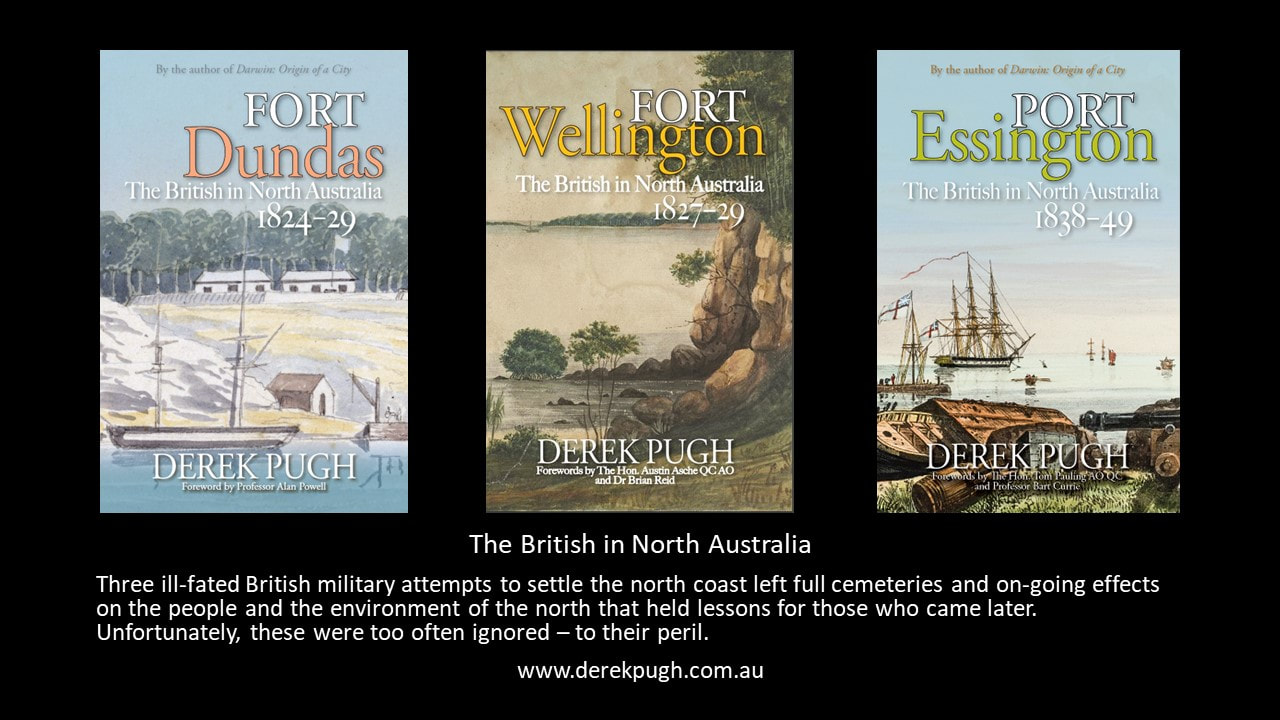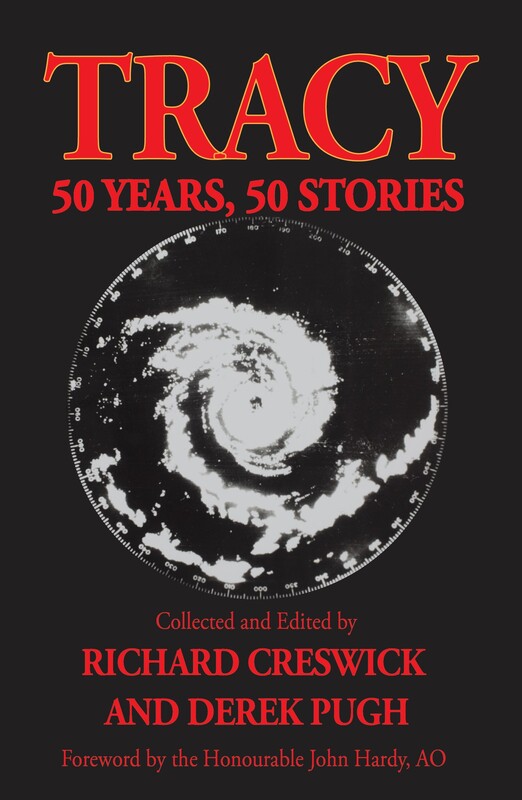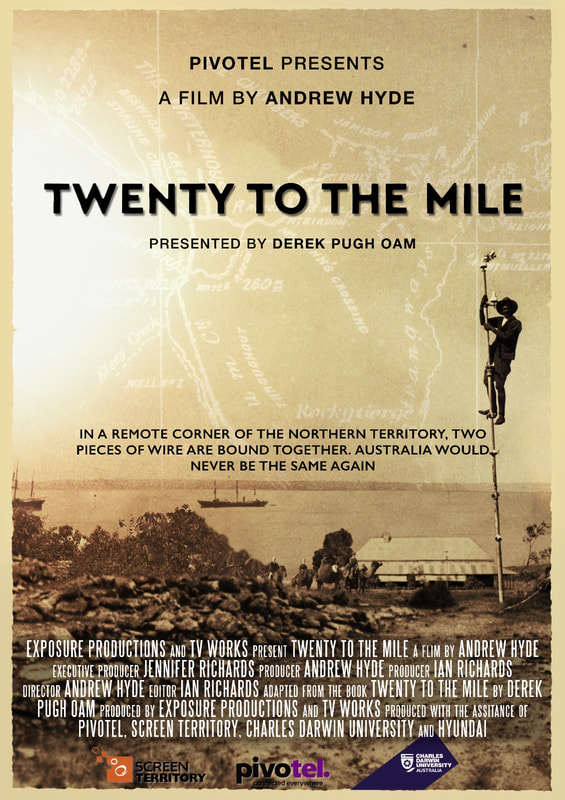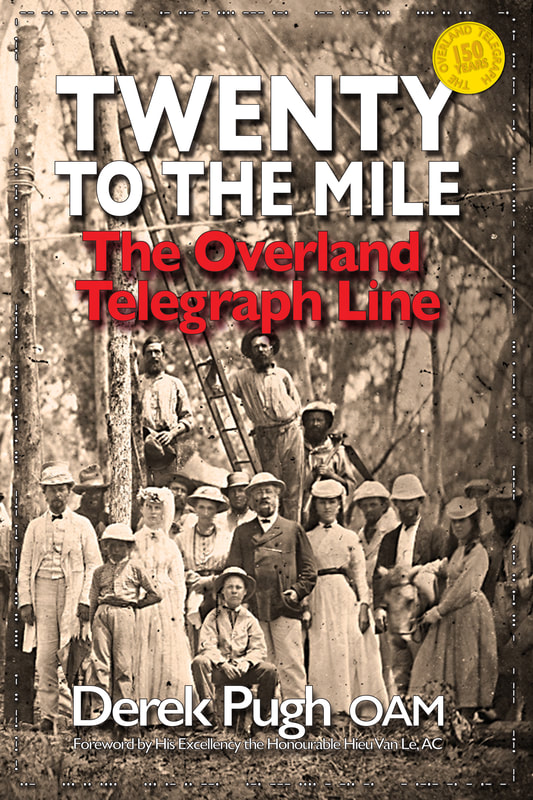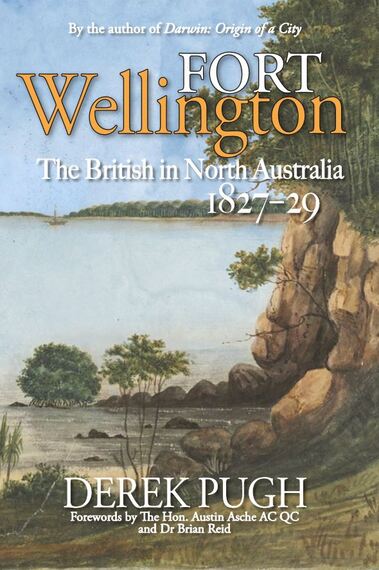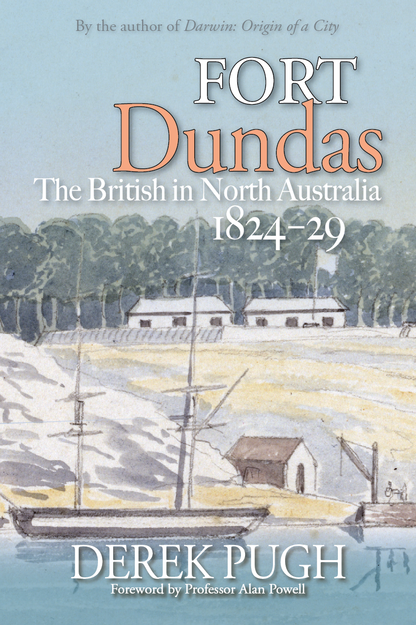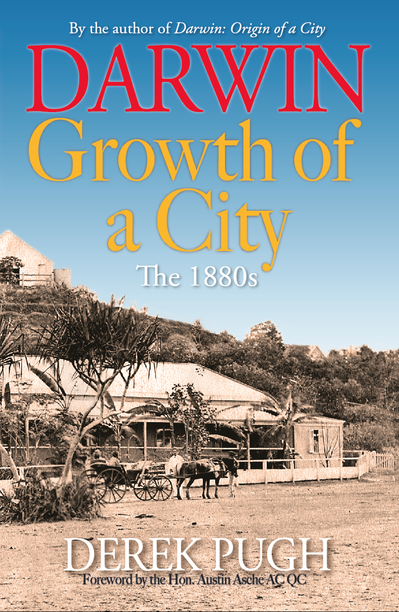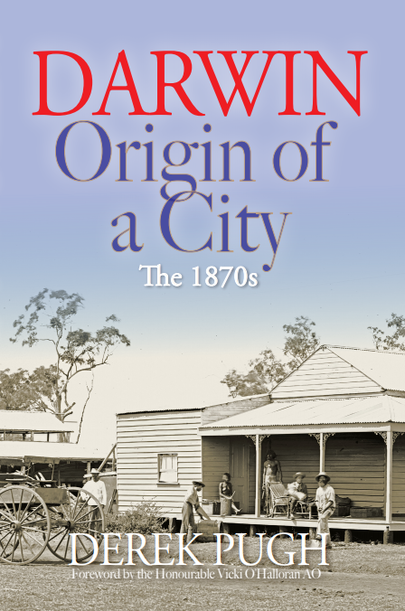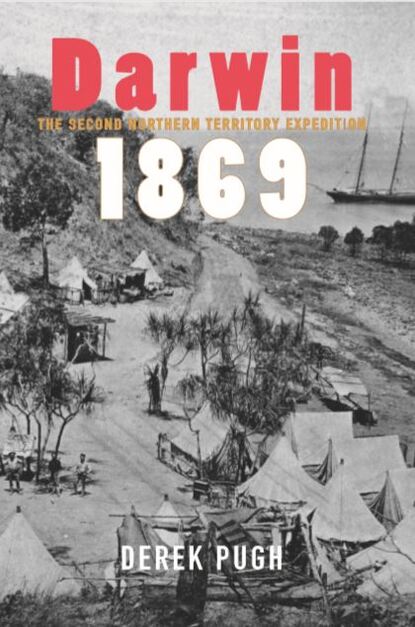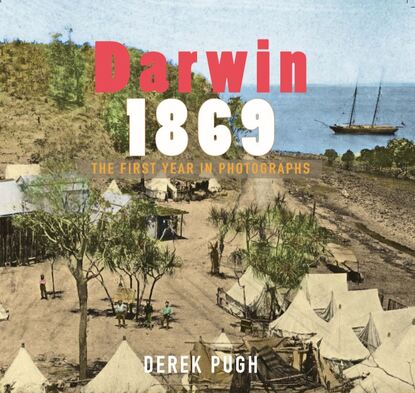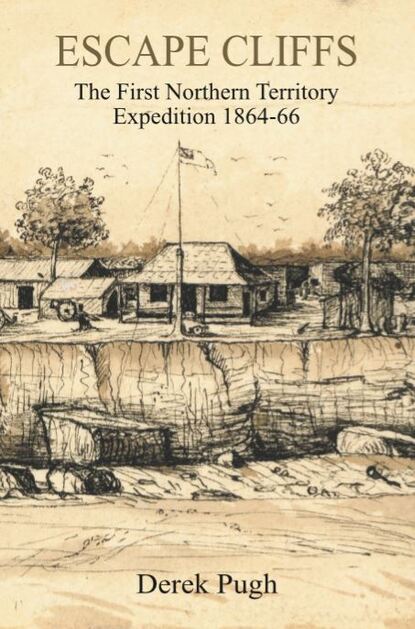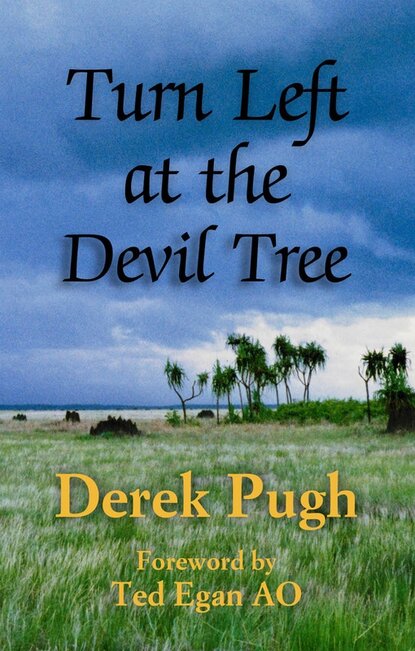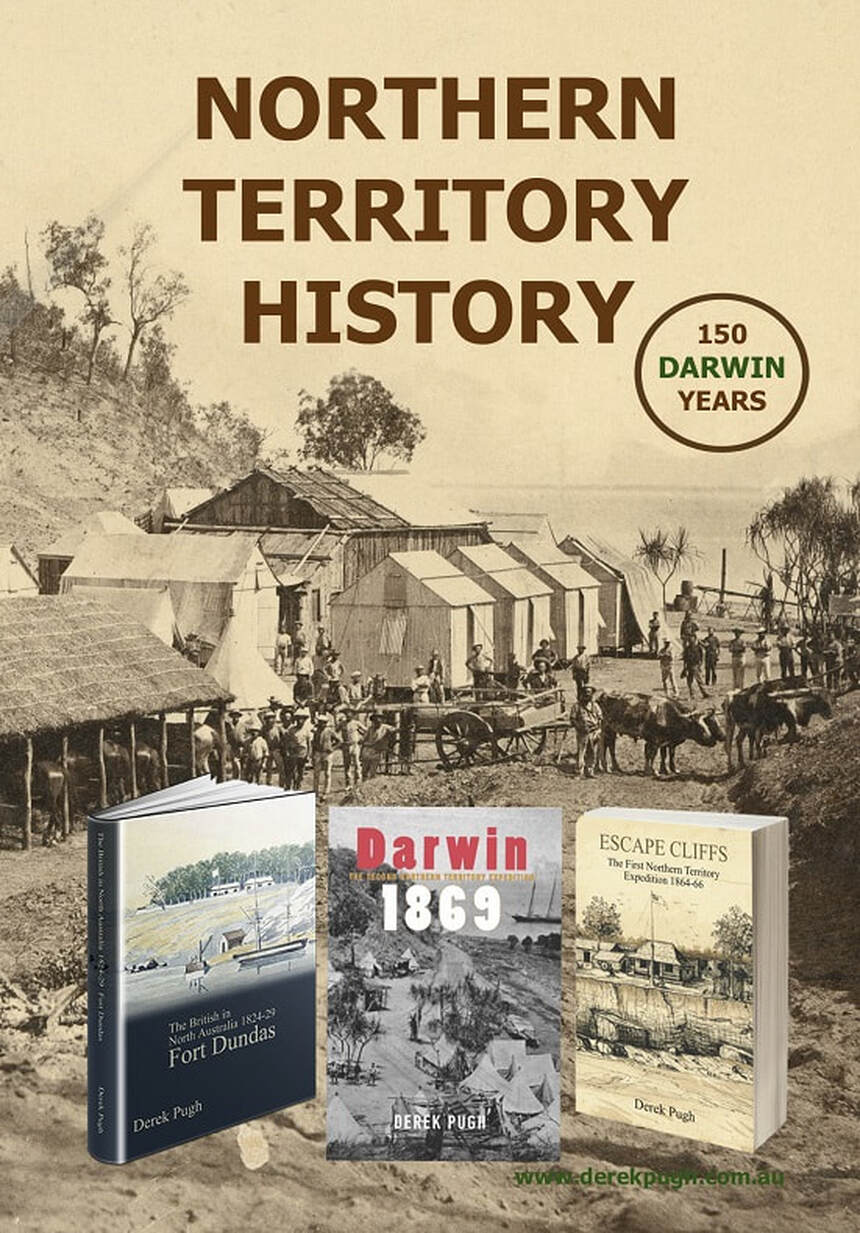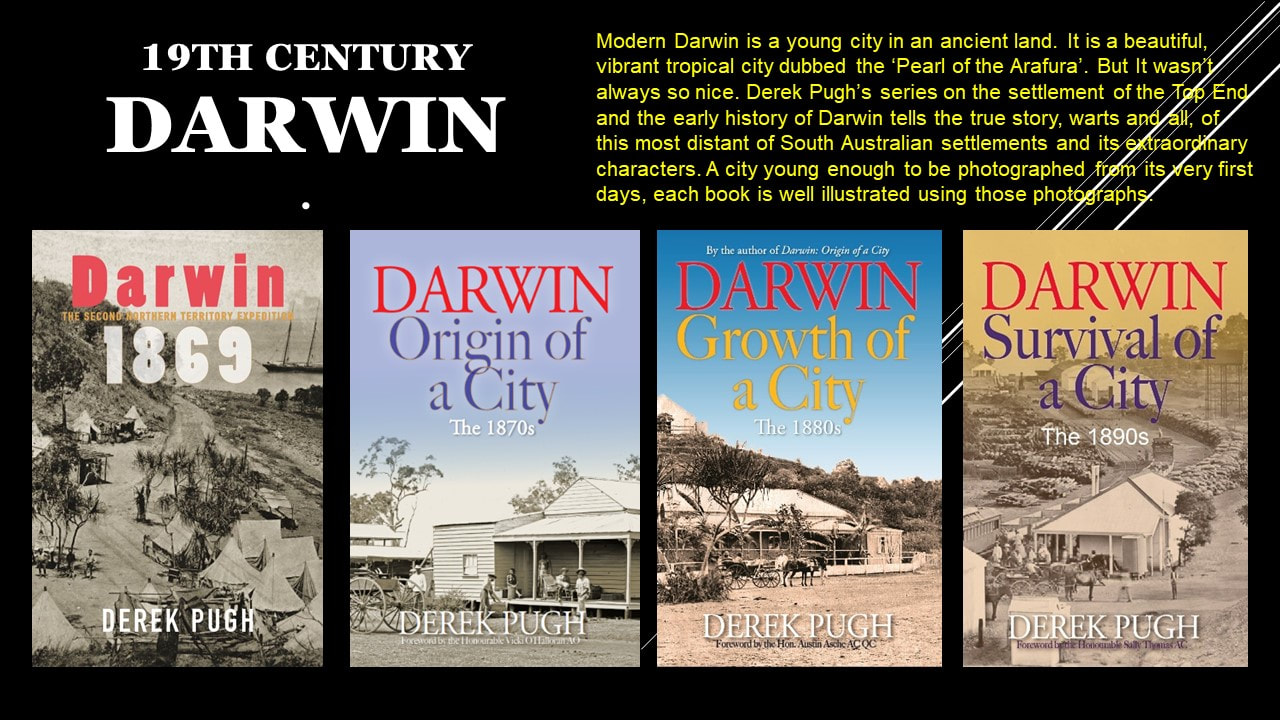
COMING in September 2024:
The Ragged Thirteen: Territory Bushrangers
In the meantime, check out this podcast from Carolyne Jasinski:
https://m.soundcloud.com/travelwritersradio/derek-pugh-author-historian-enrichment-speaker-on-kimberley-cruise-carolyne-jasinski
The Ragged Thirteen: Territory Bushrangers
In the meantime, check out this podcast from Carolyne Jasinski:
https://m.soundcloud.com/travelwritersradio/derek-pugh-author-historian-enrichment-speaker-on-kimberley-cruise-carolyne-jasinski
|
TRACY: 50 YEARS 50 STORIES
An extraordinary collection of stories of survival of the storm that destroyed Darwin. Cyclone Tracy demolished Darwin, capital of the Northern Territory when it struck during the night of Christmas Eve and Christmas Morning, 1974. Over almost ten hours the small, intense, but slow-moving weather system left a swathe of destruction across the entire town. Few buildings escaped. Sixty-six people died, many of them on vessels which put to sea, and many hundreds were injured. The destruction of essential services made a reduction in the population of about 40,000 imperative and what followed was the greatest peacetime evacuation of an Australian community with nearly 10,000 leaving by road and more than 20,000 evacuated by air. Every survivor has a story and just over 50 of them have responded to the invitation to tell theirs, some for the first time, in their own words. We admire them for their resilience and thank them for their contribution to this remarkable collection. AVAILABLE BY MAIL ORDER IN AUSTRALIA $35 + $10.60. AVAILABLE AS PRINT ON DEMAND IN THE UK AND USA. |
NEW, now available
|
Listen to an ABC podcast on Conversations with Richard Fidler https://www.abc.net.au/radio/programs/conversations/overland-telegraph-line-nt-charles-todd-derek-pugh/13793392 VIDEO: Documentary explores 1872 effort to link Australia to the world. Watch the ABC News item from 1/10/2023 here To view a trailer of the film based on the book https://fb.watch/myLadsTRlr/ Twenty to the Mile: THE OVERLAND TELEGRAPH LINE. The greatest engineering feat of 19th century Australia The greatest engineering problem facing Australia – the tyranny of distance – had a solution: the electric telegraph, and its champion was the sheep-farming state of South Australia. In two years, Charles Todd, leading hundreds of men, constructed a telegraph line across the centre of the continent from Port Augusta to Port Darwin. At nearly 3,000 kilometres long and using 36,000 poles at ’20 to the mile’, it was a mammoth undertaking but in October 1872, Adelaide was finally linked to London. The Overland Telegraph Line crossed Aboriginal lands first seen by John McDouall Stuart just 10 years before. Messages which previously took weeks to cross the country now took hours. Passing through eleven new repeater stations and the remotest parts of Australia, the line joined the vast global telegraph network, and a new era was ushered in. Each station held a staff of six. They became centres of white civilization and the cattle or sheep industry. In many places the local Aborigines were displaced. The unique stories of how men and women lived and/or died on the line range from heroic through desperate, to tragic, but they remain an indelible part of Australia’s history. … a book written with heart and admiration… a lasting tribute to the inventiveness and tenacity of the people behind the planning, building and execution of the Overland Telegraph – a true nation building endeavour (His Excellency, The Honourable Hieu Van Le AC). email now for informaton: [email protected] MEDIA RELEASE These days, computers and mobile devices keep us in touch with each other as never before, and news and information is instantly available. Australia no longer suffers the ‘tyranny of distance’, but it was very different in colonial Australia. Months would pass before letters could be answered and international news was always old when it was finally printed in the papers. This all changed after the completion of the greatest engineering feat of the 19th century. In 1872, the Overland Telegraph Line connected Adelaide to London, and communication channels were open. But first, the tiny colony of Palmerston, now called Darwin, needed to be connected to the world’s telegraph system by an undersea cable. This was pulled on shore by men and horses on 7 November 1871, 150 years ago. The first telegram to Australia arrived 12 days later, on 19 November 1871. The Morse code message was tapped out by Captain Robert Halpin after he and a fleet of three ships laid the cable on the sea floor between Port Darwin and Banyuwangi in Java. Proudly written, our first electric communication simply ended with “Advance Australia” Darwin historian Derek Pugh said “the OTL was the internet of the day, allowing rapid communication with the world. It provided almost instant access to information and broke the tyranny of distance. The arrival of the international cable was the first step of this huge technological leap”. The incredible story of the OTL is told in Pugh’s new book Twenty to the Mile: The Overland Telegraph Line. Available now, cost $39.95 plus postage. Wholesale distribution by Woodslane. For more information on the 2022 sequicentenary celebrations of the OTL see https://ot150.net 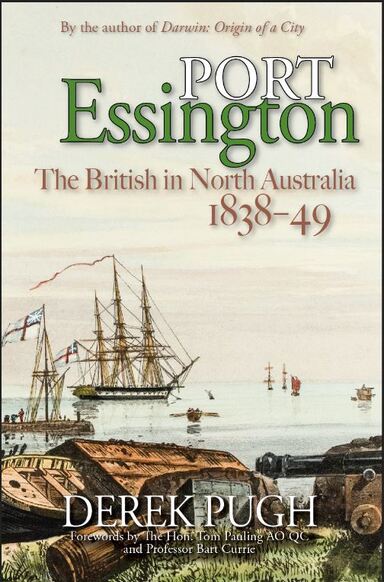
***Shortlisted for the NT Chief Minister's History Award 2021 PORT ESSINGTON: The British in North Australia 1838-49 For many of the Royal Marines sent to Port Essington, life was a living hell of malaria, scurvy, termites, shipwrecks, cyclones, boredom, isolation, and death. For one man it was the ‘most useless, miserable, ill-managed hole in Her Majesty’s dominions’ which deserved ‘all the abuse that has ever been heaped upon it’. But it wasn’t always so: In the beginning, French visitors shared their best Bordeaux wines and partied at Government House; small boats raced in regattas across the harbour; men played cricket; and the gardens grew the best pineapples in the southern hemisphere. Led by the stoic Captain John McArthur for 11 years, this is the story of the rise and fall of a peaceful little British village in the most distant part of the empire, and of how the chief occupation of the survivors became grave digging. ‘a splendid read full of heartbreak, hope, despair, ambition and resilience’ (Tom Pauling AO QC). MORE>>>\ |
|
|
DARWIN: Growth of a City The 1880s This sequel to Darwin: Origin of a City tells stories from the Top End in the 1880s. The 1880s started with a boom in Palmerston and the Top End. South Australian investors flocked to put their money into gold mines, sugar and coffee plantations, and the pastoral industry. Cattle stations bigger than a British county were carved out of the bush. The Overland Telegraph Line stretched across the continent, and the Top End was alive with Aborigines, explorers, agriculturalists, pastoralists, and reef miners. Then came the railway builders, pearl divers, Chinese ‘Coolies’, and ‘misfits, missionaries and mercenaries’. The story of Palmerston (Darwin) and the Top End in the 1880s is a story of murder and mayhem, fortunes won and lost, challenges taken up, tragedies unfold, and golden opportunities grasped by extraordinary men and women. It was they who began to turn this remote area of Australia into what it is today, and they who forged a new Australian identity — the ‘Territorian’. *Shortlisted for the NT Chief Minister's Best Non-fiction Award 2020. DARWIN: Origin of a City The 1870s In January 1870, the first Top End settlers arrived to find very little 'settlement' ready for them, other than surveyed blocks of land sold to distant investors. They built their colony from scratch, with little tangible reason for its existence until the overland telegraph line came through from London to join Australia to the rest of the world. Then gold was discovered, and hopeful miners rushed to Darwin from all over the country. Most went home disappointed; if they survived the privations of the bush. Then the government imported Chinese workers – and they kept coming; gold dust shining in their eyes. By the end of the decade there were ten times as many Chinese as European settlers, and Chinatown was the most vibrant part of the settlement. MORE>>> |
|
DARWIN 1869: The Second Northern Territory Expedition In February 1869, a motivated and professional team of surveyors and their support staff arrived in Darwin Harbour to measure the land and divide it into allotments that were already sold by the South Australian government. It was the second attempt by the South Australians to establish a colony on the north coast and, under the leadership of the Surveyor General, George Goyder, the work was done at an astonishing rate. MORE... DARWIN 1869: The First Year in Photographs All the 1869 photographs of Captain Samuel Sweet, plus the story of settlement in a larger format. |
YA Fiction

BIO: Dr. Derek Pugh OAM is a distinguished educator and acclaimed author, renowned for his captivating storytelling across multiple genres, including history, science, adventure travel, and young adult fiction. His prolific literary career spans a diverse range of subjects, reflecting his insatiable curiosity and deep connection to the Northern Territory's rich tapestry of history and culture.
One of Dr. Pugh's most notable contributions to historical literature is his comprehensive 10-book series chronicling the early European settlement of the Top End. Through meticulous research and vivid narrative, he brings to life the challenges, triumphs, and complexities of this pivotal period in Northern Territory history. Additionally, his works such as "Tambora" delve into scientific phenomena, while novels like "Tammy Damulkurra" and "Schoolies" captivate readers with their engaging storytelling and relatable characters.
Dr. Pugh's dedication to education has taken him on a remarkable journey, from large urban senior schools to remote homeland centre schools in Central Arnhem Land, as well as international schools around the globe. His commitment to fostering learning and cultural exchange has left an indelible mark on countless students and communities.
Residing in Darwin, Dr. Pugh continues to be a prolific writer, delving into Northern Territory settlement history with unwavering passion and expertise. His work extends beyond the written word, as he also served as the presenter in the acclaimed documentary film "Twenty to the Mile" (2023), further illuminating the region's captivating history and heritage.
In recognition of his exceptional contributions to education and literature, Dr. Derek Pugh was awarded the Order of Australia Medal in 2020. Additionally, his outstanding achievements were honoured with a Doctorate of Letters (D. Litt, honoris causa) from Charles Darwin University in 2024, further solidifying his status as a revered figure in both academia and the literary world.
Awards:
Winner: Territory Read Best Non-Fiction Book 2016 for Tambora: Travels to Sumbawa and the Mountain of Change
Short-listed: Chief Minister's Book of the Year, 2016 for Tambora
Short-listed: Chief Minister's Book of the Year, 2020 for Darwin: Origin of a City
Short-listed: Chief Minister's Book of the Year, 2021 for Port Essington
Buy Derek Pugh Books directly from the author here
Book and eBook Distribution:
Darwin: Survival of a City: The 1890s Coming soon
Twenty to the Mile: The Overland Telegraph Line https://www.booktopia.com.au/twenty-to-the-mile-the-overland-telegraph-line-derek-pugh/book/9780648142195.html
Port Essington: the British in North Australia 1838-49 https://www.booktopia.com.au/port-essington-derek-pugh/book/9780648142171.html
Darwin: Growth of a City. The 1880s - https://www.booktopia.com.au/darwin-derek-pugh/book/9780648142188.html
Darwin: Origin of a City. The 1870s - https://www.woodslane.com.au/Book/9780648142140/Darwin-Origin-of-a-City
Darwin 1869: The Second Northern Territory Expedition - https://www.woodslane.com.au/Book/9780648142126/Darwin-1869
Darwin 1869: The First Year in Photographs - https://www.woodslane.com.au/Book/9780648142133/Darwin-1869-The-First-Year-in-Photographs
Escape Cliffs: The First Northern Territory Expedition - https://www.woodslane.com.au/Book/9780648142102/Escape-Cliffs
Fort Dundas - The British in North Australia 1824-29. https://www.woodslane.com.au/Book/9780992355869/Fort-Dundas
Fort Wellington: The British in North Australia 1827-29
Tambora - email: [email protected]
Tammy Damulkurra - email: [email protected]
Turn Left at the Devil Tree - email: [email protected]
The Owner's Guide to the Teenage Brain:email: [email protected]
Schoolies: eBook, book: https://www.booktopia.com.au/schoolies-derek-pugh/book/9780648142157.html
or email [email protected]
One of Dr. Pugh's most notable contributions to historical literature is his comprehensive 10-book series chronicling the early European settlement of the Top End. Through meticulous research and vivid narrative, he brings to life the challenges, triumphs, and complexities of this pivotal period in Northern Territory history. Additionally, his works such as "Tambora" delve into scientific phenomena, while novels like "Tammy Damulkurra" and "Schoolies" captivate readers with their engaging storytelling and relatable characters.
Dr. Pugh's dedication to education has taken him on a remarkable journey, from large urban senior schools to remote homeland centre schools in Central Arnhem Land, as well as international schools around the globe. His commitment to fostering learning and cultural exchange has left an indelible mark on countless students and communities.
Residing in Darwin, Dr. Pugh continues to be a prolific writer, delving into Northern Territory settlement history with unwavering passion and expertise. His work extends beyond the written word, as he also served as the presenter in the acclaimed documentary film "Twenty to the Mile" (2023), further illuminating the region's captivating history and heritage.
In recognition of his exceptional contributions to education and literature, Dr. Derek Pugh was awarded the Order of Australia Medal in 2020. Additionally, his outstanding achievements were honoured with a Doctorate of Letters (D. Litt, honoris causa) from Charles Darwin University in 2024, further solidifying his status as a revered figure in both academia and the literary world.
Awards:
Winner: Territory Read Best Non-Fiction Book 2016 for Tambora: Travels to Sumbawa and the Mountain of Change
Short-listed: Chief Minister's Book of the Year, 2016 for Tambora
Short-listed: Chief Minister's Book of the Year, 2020 for Darwin: Origin of a City
Short-listed: Chief Minister's Book of the Year, 2021 for Port Essington
Buy Derek Pugh Books directly from the author here
Book and eBook Distribution:
Darwin: Survival of a City: The 1890s Coming soon
Twenty to the Mile: The Overland Telegraph Line https://www.booktopia.com.au/twenty-to-the-mile-the-overland-telegraph-line-derek-pugh/book/9780648142195.html
Port Essington: the British in North Australia 1838-49 https://www.booktopia.com.au/port-essington-derek-pugh/book/9780648142171.html
Darwin: Growth of a City. The 1880s - https://www.booktopia.com.au/darwin-derek-pugh/book/9780648142188.html
Darwin: Origin of a City. The 1870s - https://www.woodslane.com.au/Book/9780648142140/Darwin-Origin-of-a-City
Darwin 1869: The Second Northern Territory Expedition - https://www.woodslane.com.au/Book/9780648142126/Darwin-1869
Darwin 1869: The First Year in Photographs - https://www.woodslane.com.au/Book/9780648142133/Darwin-1869-The-First-Year-in-Photographs
Escape Cliffs: The First Northern Territory Expedition - https://www.woodslane.com.au/Book/9780648142102/Escape-Cliffs
Fort Dundas - The British in North Australia 1824-29. https://www.woodslane.com.au/Book/9780992355869/Fort-Dundas
Fort Wellington: The British in North Australia 1827-29
Tambora - email: [email protected]
Tammy Damulkurra - email: [email protected]
Turn Left at the Devil Tree - email: [email protected]
The Owner's Guide to the Teenage Brain:email: [email protected]
Schoolies: eBook, book: https://www.booktopia.com.au/schoolies-derek-pugh/book/9780648142157.html
or email [email protected]

